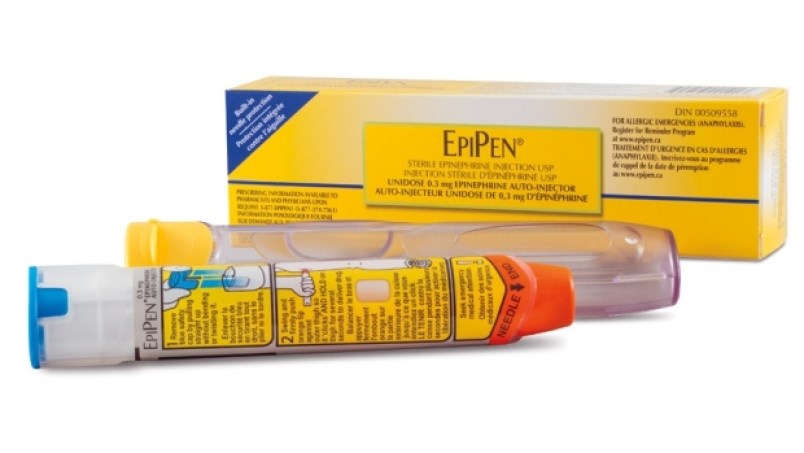Residents from Simcoe County and beyond are scrambling to get their hands on EpiPens now that Health Canada has announced that there is a shortage of the life-saving devices across Canada.
However a local allergist says this has been an issue since much earlier this year.
Dr. David Fischer is an allergist in Barrie, as well as the president of Canadian Society of Allergy and Clinical Immunology. When reached for an interview on Wednesday, he said there have been problems with the EpiPen supply since January.
“Since January, we’ve been in one of two modes in Canada: preventative allocation and/or shortage,” he said.
Preventative allocation means that when patients have been going to pharmacies with prescriptions, pharmacies have been encouraged to dispense a smaller number than requested. Full-out shortage means that pharmacies are completely out and have to turn people away. Fischer says that while the year started out with a preventative allocation situation, in August the country is now in true shortage mode.
The shortage is expected to last until the end of August.
“From what we’ve been told, there should be a new shipment arriving at the end of August,” said Fischer.
Fischer says the cause of the shortage is a manufacturing problem at the U.S. Pfizer plant that occurred at the end of 2017.
Pfizer Canada imports all EpiPens from the U.S. There have also been shortages in Australia, the U.K. and the U.S as a result of the problem.
“The bigger issue is... Canada because we do not have an alternative,” said Fischer.
In the U.S. and the U.K., there are other devices available that dispense epinephrine. In Canada, Pfizer Canada has a monopoly on epinephrine devices.
Fischer says the Canadian Society of Allergy and Clinical Immunology would welcome diversity of supply in Canada to prevent these types of issues going forward.
“We would encourage the presence of a wider and more diverse group of EpiPen-type devices, especially in episodes of shortage like this,” said Fischer.
If you have serious allergies and can’t get hold of new EpiPens from your pharmacy, Fischer suggests checking the expiry dates on the ones you already have.
“If you have EpiPens, don’t throw them out,” he said. “There were 100,000 pens distributed in Canada with the expiry date of August 2018. These pens expire at the end of August, and will be safe to use throughout the month if needed.”
Fischer points to a study in the Journal of the American Medical Association (JAMA) that indicates that even long-expired EpiPens will have enough medication in them to give a kick of adrenaline in the event of an allergic reaction.
“If the pen is expired, we would still recommend using it in a medical emergency if there are no alternatives,” said Fischer. “Expired pens are easily better than no pen.”
Simcoe County Paramedics don’t carry EpiPens so the shortage doesn’t affect them directly, said Deputy Chief JC Gilbert.
“We carry large dosages of the medication itself and we deliver it through injection or IV,” said Gilbert.
In the event of an attack, people who know they have a severe allergy should follow their instincts regarding using an EpiPen, as well as calling 911 in any emergency.
“They shouldn’t hesitate to use their medication just because there’s a shortage,” he said.
EpiPen Juniors are also still available, and Gilbert notes that two EpiPen Juniors carry the equivalent dosage to one adult EpiPen.



